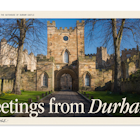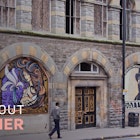
Secret London: 9 unusual sights hidden in the city
Oct 13, 2020 • 3 min read

Cross Bones Graveyard, a monument to outsiders © NurPhoto via Getty
Think you know London? Think again. From historically significant monuments to quirks of architecture and resting places for the dead, we've rounded up nine of the strangest spots in the city. These attractions, hidden away from the main sights, will help you see the capital with fresh eyes.
- placement: fullWidth
- path: articles/in-content-top
- possible size: [970, 250], [970, 90], [728, 90], [300, 250], [320, 50], [1, 1],
- targeting:
{ "url": "strange-sights-secret-london", "destination": "London", "continent": "Europe", "country": "England", "city": "London" }
Editor's note: opening times may be affected by COVID-19. Always follow government health advice and local travel restrictions.
1. Crossbones Garden
Corpses considered too unseemly for holy ground were buried at Crossbones burial plot, including sex workers. This resting place is now a monument to London’s outsiders, with a garden maintained by volunteers and a space for workshops, memorials and talks.
2. Soho Noses
From 1996 to 2005, artist Rick Buckley secreted up to 35 plaster noses, casts of his own, around Soho. The project is thought to be a statement about the nosiness of London’s widespread CCTV cameras, although plenty of urban myths have sprung up around them. Only about ten survive and finding them all will bring you through some of London's most famous spots.
3. Hoxton Street Monster Supplies
Forget Buckingham Palace fridge magnets, the ideal London souvenir is a tin of mortal terror or cubed earwax from this East London curiosity shop. Humans are welcome, as well as monsters and the undead, and all profits from the store go to a creative writing charity for kids.
4. Eisenhower Air Raid Shelter
Eight London Tube stations had deep air raid shelters during WWII. On Chenies St, near Goodge St underground station, you'll find this pillbox-shaped building. It was used by US Army Signal Corps in the run-up to D-Day, but never actually played host to General Eisenhower, despite the name.
- placement: fullWidth
- path: articles/in-content-middle
- possible size: [970, 250], [970, 90], [728, 90], [300, 250], [320, 50], [1, 1],
- targeting:
{ "url": "strange-sights-secret-london", "destination": "London", "continent": "Europe", "country": "England", "city": "London" }
5. Hyde Park's Pet Cemetery

This pint-sized cemetery, established in Hyde Park in 1881, is the final resting place of beloved pets from the Victorian era. The 300 little burial plots hold mainly dogs, although there is at least one feline resident. The first stone laid here is engraved with "Poor Cherry", in memory of a terrier. The names alone are worth the visit; alongside Ruff and Spot, you'll also see Yum Yum, Baby and Scum.
6. Fake Houses of Leinster Gardens
These Bayswater houses are not what they appear. Walk around the back of this seemingly unbroken line of terraced houses and you’ll see two of them are just a facade, hiding uncovered train tracks. The false houses were created in the 1860s when the real ones had to be demolished. They also appeared in an episode of BBC's Sherlock.
7. Dennis Severs' House

- placement: native
- path: articles/in-content-native
- possible size: [f, l],
- targeting:
{ "url": "strange-sights-secret-london", "destination": "London", "continent": "Europe", "country": "England", "city": "London" }
One of London's most immersive oddities is Dennis Severs’ House in Spitalfields. The artist arranged the 10 rooms of this Georgian townhouse as a "still-life drama" of London life in the 18th and 19th centuries. Discarded clothing and lingering smoke give visitors the uncanny impression that the house’s fictional aristocratic residents are only steps ahead of them.
8. Broad Street Water Pump
An 1854 cholera epidemic was halted simply by turning off a tap. A replica pump, in what is now Broadwick St, marks where Dr John Snow traced the outbreak and removed the handle. His investigation helped kickstart improved sanitation in the city and is the first recorded example of a "double-blind experiment".
9. Temple of Mithras

In 1954, the remains of a Temple of Mithras were discovered in the heart of London’s financial district. Town planners were undeterred and simply relocated the ruins. The temple has since been moved back (almost) to its original spot and in 2017, a reconstructed version opened to the public as London Mithraeum, and included artefacts from Roman London.
This extract is adapted from Lonely Planet's Secret Marvels of the World. Buy your copy now to discover more quirky attractions and hidden history.
You might also like:
16 things you never knew about London
E2 beyond Shoreditch: a guide to east London's coolest postcode
London watchlist: films to see before your trip
- placement: fullWidth
- path: articles/bottom
- possible size: [970, 250], [970, 90], [728, 90], [300, 250], [320, 50], [1, 1],
- targeting:
{ "url": "strange-sights-secret-london", "destination": "London", "continent": "Europe", "country": "England", "city": "London" }
Explore related stories


 AttractionI threw caution to the wind to make my son’s dream trip a reality
AttractionI threw caution to the wind to make my son’s dream trip a realityOct 6, 2023 • 15 min read




 ShoppingGet off the beaten path in Bristol for English history, culture and cutting-edge food
ShoppingGet off the beaten path in Bristol for English history, culture and cutting-edge foodAug 15, 2022 • 6 min read
 Festivals & EventsLondon is celebrating the Platinum Jubilee with Westminster Abbey rooftop tours and superblooms
Festivals & EventsLondon is celebrating the Platinum Jubilee with Westminster Abbey rooftop tours and superbloomsApr 27, 2022 • 4 min read

